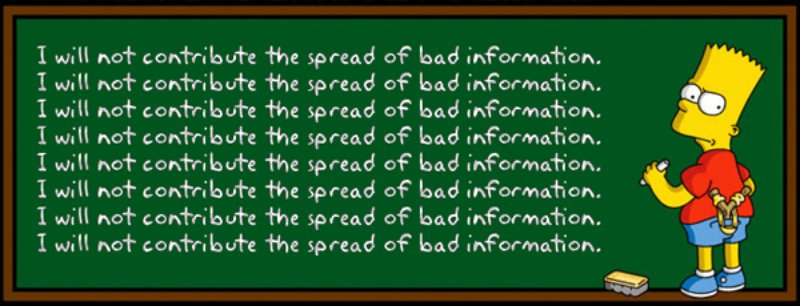
You must have heard SEO misinformation like, if you stuff keywords in your content, Google will ban your website from its Search Engine Result Page. Also, there is more, when you hear about sharing your post will increase your ranking in SEO.
Spoiler alert!!! These all are misleading half-truths, however, most of the Search Engine Optimizers, businesses, and entrepreneurs believe and follow them. Actually, it is debatable where a thin thread like line separates “Keyword Optimizing” and “Keyword Stuffing”. And for the record, Google will not simply just blacklist your website automatically for Keyword Stuffing.
Yes, for sure social sharing does have an essential role in building ranking, (There are correlations but it should not be taken as cause and effect.) and Google continuously denied to accept that fact. In addition to that, there is a correlation between social sharing and inbound links. We all know that the inbound links play a significant role in boosting SEO rankings. But making a claim that getting “High social shares will equal higher ranking” is a misconception, in fact, it is a half truth and half truth always misleads.
Looking for reliable SEO Services for your Website? Click Here
So, the core question still prevails, why these SEO misinformations are so rampant inside and outside the industry.
The Unfortunate Situation of Half Truths
Unlike outright myths, the tendency of the half-truths is to spread and circulate. However, we have faced lots of myths and misconceptions. The bottom line of these points is that they are spread among the people who are outside the SEO industry. It is just like when a person who didn’t work or learn SEO at all. It is easy for them to believe such “old stereotype that SEO is a cheap gimmick designed to game the system.”
These half truths are penetrating the industry just because people are not working with direct information. All the search engines including Google keep their algorithms a secret, just providing little hints about what they might consider to rank a website and do not bother to disclose anything. When someone represents an idea which has the even little scope of acceptance, then they’re accepted as facts.
For instance take an example of social media’s claim, which says, earning shares will increase the chances of getting more inbound links (As your content is visible to people). However, it is not just the social share doing work.
Now, whether is it a good idea to use this method to increase inbound link? Yes, indeed a good idea. But for better results relying on just social sharing method will not replicate such high result. Remember, this is one out of many methods to increase the inbound links.
This is a half-truth which is easy to accept and we have instinctual knowledge about how the search engine works. We don’t know exactly how a Search Engine works.
The Fast-Paced Industry
One of the major cause for SEO misinformation is because SEO industry is also moving so quickly. Google always undergoes from a big packet release of updates to its algorithms which are game changing and to adopt a gradual release schedule, distribution of newer techs and incredible search trends which makes even harder for search optimizers to keep up.
This can create few ripples to the spread of the misinformation. First, you can easily declare a previous valid information obsolete. For instance, take an example, there was those time when it was such a good idea to make anchor text for your link as an exact match of the keywords.
Now moving to the second point. And this is more of a psych-related. Everyone wants to be first to cover anything new, it can be an update or search story. This desperation often leads to the distribution of incomplete information. Generally, it is very plausible and very beneficial that we spread and circulates information in pieces- this can be crucial to get the bigger picture- However, most of the time people make assumptions very early hence end up misunderstanding almost everything.
As these points prove that the nature and the pace of the industry are super fast which implies people converse and blog very quickly. So, this means that if bad information leaks, it will not take more than 2 days to spread in the community. Fortunate for us that our community self-heals, i.e., it is very fast to course-correct. However, it still does leave many people exposed to the bad information’s influence for that short period of time.
How Can You Protect Yourself?
It doesn’t matter if you’re new to the SEO industry or a seasoned expert who spends a lot of time pursuing new information. There are some measure and reckon it to take it to further prevent the spread of these SEO misinformations. These are jotted down below:-
Confirm Your Sources
First, cross-check with your sources. If an SEO tip is given by a person in a networking event, for example, you must consider if they have any widespread experience in the industry of SEO. It is as simple as this, someone who already in SEO industry will give more robust information than a newbie. As far as online researchers and tips are consults, use information from the persons and organizations you trust. There are abundant of websites, organizations, and personnel who tend to provide SEO tips and guides, however not all they are ideal in relevant experiences.
Always Look for Hard Shreds of Evidence
An Anecdotal evidence may suffice you. For an instance, I constantly keep an eye on www.backlinko.com of Brian Dean. I have seen his content full of anecdotal evidence spread throughout his content. What this website do is really ironic. He provides self-tested tips which he tests first on himself and then shares it with people. Another illustration will be www.quicksprout.com which is handled by Neil Patel.
So, if some people are benefited by the particular tip, there is no harm in including that. This even put more relevance to the point presented by them. For serving such purposes, I recommend you to look for realistic data points, replicability, and statistical analysis. Also, working just with one person doesn’t make it a ground rule that it will work for everyone else. So, always look for some stats that show how people can be benefitted.
Look for Cross Reference
Even if you see information from a source which is trustworthy, still cross check that information from another source to make sure about the information (I hope you remember there are loads of resources to check from). So, always cross check without giving it another thought. This will help you to empower your knowledge and if in case you’re a blogger then it will serve your viewers the same purpose.
Keep Challenging your Assumption
This is a tip for all search optimizer- never keep your assumption remain unchecked. The thing is SEO industry is dynamic and changes a lot which leads us to SEO misinformation. The key factor here is always trying to disagree with yourself. Never get sorted without thoroughly analyzing your assumptions. This will take a lot of time but the ultimate result will be closer to the fact.
I know that the SEO misconception is not getting away anytime sooner, however, you should be ready to deal with it so that your organization will not suffer the consequences of these misconceptions as they can be very dangerous for the profit of a business. So stay alert for it and always. Never ever let your guard down.
Just a quick recap about what you should do when an encounter with such SEO misinformation.
- Confirm your sources
- Always look for hard evidence
- Look for cross reference
- Keep Challenging your Assumption
Keep doing that and make it your habit of tackling such grave problems in future.
If you’re looking to enhance your online presence, consider us as a best SEO Services in Singapore. Our expert team can help your business rank higher in search results, driving more traffic and potential customers to your site. Don’t miss out on the opportunity to grow your business with effective SEO strategies



